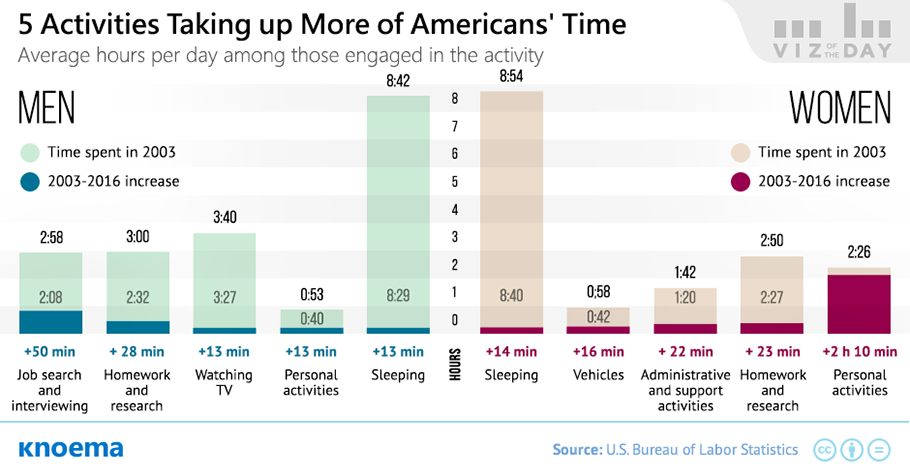Every day we have just 24 hours to accomplish it all. And, every day we make hundreds of decisions to parse out those 24 hours. The US Bureau of Labor Statistics in its American Time Use Survey examines just how Americans divvy up their time with input gathered from over 180,000 interviewees aged 15 and older. The survey yields unique insight into"how, where, and with whom Americans spend their time”. Following are a few "how" highlights from the 2016 survey:
- In 2016, Americans spent an additional 11 minutes on average daily on “relaxation and leisure”, with TV viewing accounting for the largest gain, especially among male respondents. Men seeking jobs also reported spending about 50 minutes more per day job seeking than they did in 2003.
- American women added the most time to “personal/private activities”, however, only 0.5 percent of surveyed women indicated spending any time on this activity. The top 10 activities for women overall were unchanged between 2003 and 2016, with personal care, sleep, and leisure and sports accounting for the top three activities.
- A variety of other distinct, gender specific habits emerges from the data. American men reported working roughly 1.5 hours more per day in 2016 than American women and reported more time spent on sports, watching TV, and playing games. In contrast, women reported more time for sleep, personal grooming, and housework.
Материалы по теме
Семья, работа, друзья, отдых, религия и политика - что люди в разных странах ценят больше?
В одах Венский Институт Сравнительных Социальных Исследований провел изучение жизненных ценностей населения мира в шестой раз. Впервые оно было проведено еще в 1981 году и с тех пор проводится каждые пять лет, охватив за это время около 400 тысяч человек из почти 100 стран мира, составляющих 90% мирового населения. Это делает его самым большим международным исследованием ценностей, взглядов и убеждений людей, которое когда-либо проводилось в мире. Последняя волна исследования включила в себя опрос 80 тысяч человек из 60 стран мира. В рамках опроса людям было предложено ответить на более чем двести вопросов, касающихся их...
Time spent on free time activities
21 October 2015 - If life seems more rushed than ever, you might be surprised to learn that we actually have more leisure time than we did 40 years ago, and quite a bit more. So why does it feel like we have so much less? It might be because we waste half of all our leisure time watching television. Globally, people devote more than 2.5 hours a day to viewing television programs despite the diversity of leisure options. How people spend their leisure time has significantly changed and is evident even in the short period from 2003-2010 captured in the visualizations below. Men and women spend no more than one hour a day on sport activities,...
Did the World Become Safer in 2016?
News headlines around the world inundate us with stories about terrorism, conflict, social unrest, plane crashes, natural disasters, global economic crises and more, always more. One might even think that 2016 was the worst year ever for humanity. But, was it? At Knoema, we let the data speak for itself. We have collected the most frequently updated and the most up-to-date statistics from reliable sources to take a practical view of the state of the world and how it has changed over the last year. By at least some measures, the world ended 2016 better than it ended 2015, with at least one notable exception. Pakistan. We do not yet know...
Aging Society as an Agent of Economic Change in India
People are living longer and, in some parts of the world, healthier lives. This represents one of the crowning achievements of the last century but also a significant challenge. Longer lives must be planned for. Societal aging may affect economic growth and many other issues, including the sustainability of families, the ability of states and communities to provide resources for older citizens, and international relations. Preparing financially for longer lives and finding ways to reduce aging-related disability should become national and global priorities. Experience shows that for nations, as for individuals, it is critical to address...
